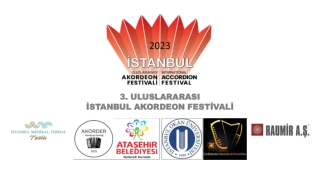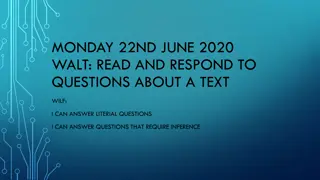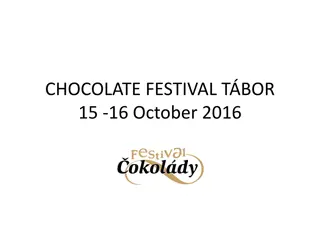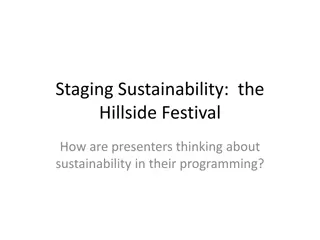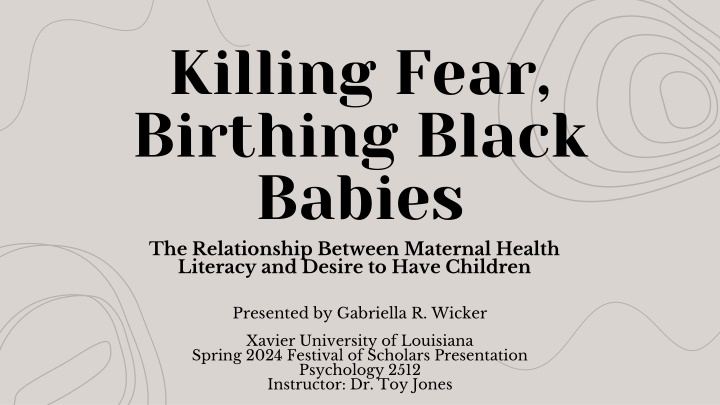
Maternal Health Literacy and Desire to Have Children in Black Women
Explore the relationship between maternal health literacy and the desire to have children in Black women. Discover how limited access to maternal health information affects decision-making. Understand the disparities in maternal mortality rates and implications for future maternity decisions.
Download Presentation

Please find below an Image/Link to download the presentation.
The content on the website is provided AS IS for your information and personal use only. It may not be sold, licensed, or shared on other websites without obtaining consent from the author. If you encounter any issues during the download, it is possible that the publisher has removed the file from their server.
You are allowed to download the files provided on this website for personal or commercial use, subject to the condition that they are used lawfully. All files are the property of their respective owners.
The content on the website is provided AS IS for your information and personal use only. It may not be sold, licensed, or shared on other websites without obtaining consent from the author.
E N D
Presentation Transcript
Killing Fear, Birthing Black Babies The Relationship Between Maternal Health Literacy and Desire to Have Children Presented by Gabriella R. Wicker Xavier University of Louisiana Spring 2024 Festival of Scholars Presentation Psychology 2512 Instructor: Dr. Toy Jones
Overview 01 05 Opening Question Literature Review 02 06 Introduction Methodology 03 Research Question 07 Results Hypotheses Discussion & Conclusion 04 08
Opening Question common? common? What do all of these women have in What do all of these women have in
Introduction In a report conducted by the Centers for Disease Control and Prevention, maternal death is defined as the non- incidental death of a woman during pregnancy due to mismanagement or natural causes. The report stated that the maternal mortality rate for Black women was 69.9 deaths per 100,000 births, almost triple the rate of White women (Centers for Disease Control and Prevention, 2019).
Introduction Maternal Health information is often left out of the already limited Sexual Education curriculum taught in the United States. How do we prevent young Black girls from becoming young Black women who use misinformation to inform their maternity decisions? Exposure is key.
Research Question Is there a relationship between the level of a Black woman s Maternal Health Literacy and her desire to have children in the future?
Hypotheses Ho: = 0 Ha: 0
Literature Review Brief History Defining Maternal Health Literacy Low health literacy (LHL) disproportionately impacts Black Americans, with 58% scoring basic or below basic on the National Assessment of Adult Literacy in 2003 (Muvuka et al., 2020). It is safe to infer that if the general health literacy rate amongst Black people is low, then the rate of maternal health literacy (a more specific sub- genre of health literacy) is equally as low or lower. Maternal health literacy is the ability of a mother (or mother to be) to find, use, and take advantage of information and resources that will positively impact their own health and that of their child(ren) (Tavananezhad et al., 2022). A study done on low-income, rural women found that women who received maternal healthcare from a Registered Nurse had higher levels of maternal health literacy after intervention. (Mobley et al., 2014).
Literature Review Barriers to Improved Health Literacy Maternal Health Resources and Impacts Doulas and Perinatal support services are amazing maternal health resources. From 2018 to 2020, 64.8% of Black women s births were covered by Medicaid (Medicaid Coverage by Race/Ethnicity: United States, 2018- 2020 Average, 2020). Medicaid does not cover the costs of doulas, perinatal support services, or obstetricians (OB s) that are not in network. Doulas are individuals trained to provide emotional and physical support to women during all stages of pregnancy (Sheikh, 2023). Obtaining adequate access to maternal health resources, and thus improving overall maternal health literacy, can be challenging for many Black women. This is, primarily, due to insurance and affordable healthcare accessibility. A study conducted in Cleveland, Ohio, defined perinatal support as support that eased participants transitions into motherhood by reducing the effects of social isolation, stress, and uncertainty (Collins et al., 2021).
Literature Review Black Maternal Literacy and Desire to Have children Desire to Have Children A study conducted in Iran aimed to discover factors that contribute to women s desire to have children in relation to this low birth rate (Araban et al., 2020). The research showed that while the women in the study aimed to have children within 2 years of participating in the study, they expressed that factors such as employment, marital satisfaction, and social support were significant in their desire to have children. The data shows that increased maternal health literacy leads to the use of more maternal health resources resulting in improved outcomes for Black mothers. The desire to have children can be impacted by a multitude of factors. By conducting a preliminary study focused on the relationship between the two, more research may be done and new policies can be created regulating maternal health literacy in the Black community.
Methodology Population Sampling Participants were anticipated to be Black female students attending Xavier University of Louisiana. All participants were expected to be enrolled in at least one Psychological Science (PSYC) course when participating in the study. Demographic information, such as classification, sexuality, and religious affiliation was asked as well. Participants were sampled using the SONA Systems platform. The SONA platform is available to all students enrolled in Psychological Sciences (PSYC) courses.
Methodology Instrumentation Data Analysis Method The Maternal Health Literacy Inventory in Pregnancy (MHELIP) is a Likert-type scale created with the goal of developing a well-rounded measure for maternal health literacy for pregnant women (Taheri et al., 2020). A linear regression was utilized to determine the strength of the relationship between the two variables. To test the significance of the relationship, an ANOVA was conducted. The Desire to Have Children Scale consists of 10 questions on a 6-point Likert-scale with the goal of measuring the intensity of participants desire to have children in the future (Natividade et al., 2020). Data was analyzed in Microsoft Excel. Scales were uploaded onto the Qualtrics platform for participants.
Methodology Procedures Participants signed-up for the study using the SONA Sytems Platform and were redirected to the Qualtrics Study. Participants read informed consent and choose whether to continue with the study.
Methodology Procedures Participants completed three sections from the Maternal Health Literacy Inventory in Pregnancy. Participants completed the demographic survey.
Methodology Procedures Participants completed the Desire to Have Children Scale. Participants were provided with a debriefing.
Results Population 39 participant sign-ups, 35 participants data used. Ages ranged from 18 to 22. High variability in religious/spiritual identities. Pregnancy and Childbirth demographic question. Figure 1 Figure 2 Participant Sexual Orientation Data Participant Classification Data
Results Figure 3 Linear Regression Graph Figure 4 Significanc e F ANOVA Summary Output Source df SS MS F Multiple R 0.60666009 5459.525 29 5459.525 29 19.2182 032 0.0001118 39 Regression 1 R Square 0.36803647 Figure 5 ANOVA Source Table Adjusted R Square 0.34888606 9374.671 14 284.0809 44 Residual 33 Standard Error 16.8547009 14834.19 64 Total 34 Observations 35
Results Upon analysis of the data, the null hypothesis has been rejected. Ho
Discussion Bias Ethics Limitations Any damage to participants mental, emotional, or physical state must be considered, even in research done through surveys. To alleviate participants of mental, emotional, or physical anguish, a list of resources for mental/emotional, physical and sexual health at Xavier University of Louisiana was provided. As a Black female researcher who desires to have children in the future, the bias I have is toward participants with this same desire. However, since the research was done virtually through surveys, the bias I have did not interfere with the participants. Survey Error Data Error Participant Interest Existing Literature
Conclusion Implications Moving Forward Further research on maternal health literacy in the Black community can support educational policy changes. Moving forward with this research topic, maternal health literacy among Black women of different socioeconomic statuses, ages and geographic locations should be studied. Further research on maternal health literacy in the Black community can support the design of community centered public health education programs.
References Araban, M., Karimy, M., Armoon, B., & Zamani-Alavijeh, F. (2020). Factors related to childbearing intentions among women: a cross-sectional study in health centers, Saveh, Iran. Journal of the Egyptian Public Health Association, 95(1). https://doi.org/10.1186/s42506-020-0035-4 Collins, C. C., Brown, P. L., Rice, H., Bronson, C., Cherney, E., Farmer, C., & DeRigne, L. (2021). Experiences of Black women during pregnancy: The meaning of perinatal support. American Journal of Orthopsychiatry, 91(5), 589 597. https://doi.org/10.1037/ort0000557 Kearney, M., Levine, P., & Pardue, L. (2022, February 15). The Mystery of the Declining U.S. Birth Rate | Econofact. Econofact.org. https://econofact.org/the-mystery-of-the-declining-u-s-birth-rate Koumouitzes-Douvia, J., & Carr, C. A. (2006). Women s Perceptions of Their Doula Support. Journal of Perinatal Education, 15(4), 34 40. https://doi.org/10.1624/105812406x151402 Medicaid Coverage by Race/Ethnicity: United States, 2018-2020 Average. (2020, December). March of Dimes | PeriStats. https://www.marchofdimes.org/peristats/data?reg=99&top=11&stop=653&lev=1&slev=1&obj=1 Mobley, S. C., Thomas, S. D., Sutherland, D. E., Hudgins, J., Ange, B. L., & Johnson, M. H. (2014). Maternal Health Literacy Progression Among Rural Perinatal Women. Maternal and Child Health Journal, 18(8), 1881 1892. https://doi.org/10.1007/s10995-014-1432-0 Muvuka, B., Combs, R. M., Ayangeakaa, S. D., Ali, N. M., Wendel, M. L., & Jackson, T. (2020). Health Literacy in African-American Communities: Barriers and Strategies. HLRP: Health Literacy Research and Practice, 4(3), e138 e143. https://doi.org/10.3928/24748307-20200617-01
References Natividade, J.-C., Londero-Santo, A., Melo de Carvalho, N., Machado de Mello, R., Nonato Machado, R., & F res-Carneiro, T. (2020). Desire to have children: Validity evidence of an instrument. Psicologia Cl nica, 32. http://pepsic.bvsalud.org/pdf/pc/v32n2/05.pdf Sheikh, Z. (2023, September 27). What Is a Doula? WebMD. https://www.webmd.com/baby/what-is- a-doula Taheri, S., Tavousi, M., Momenimovahed, Z., Direkvand-Moghadam, A., Tiznobaik, A., Suhrabi, Z., & Taghizadeh, Z. (2020). Development and psychometric properties of maternal health literacy inventory in pregnancy. PLOS ONE, 15(6), e0234305. https://doi.org/10.1371/journal.pone.0234305 Tavananezhad, N., Bolbanabad, A. M., Ghelichkhani, F., Effati-Daryani, F., & Mirghafourvand, M. (2022). The relationship between health literacy and empowerment in pregnant women: a cross- sectional study. BMC Pregnancy and Childbirth, 22(1). https://doi.org/10.1186/s12884-022-04686-z Turney, S. (2022, May 13). Pearson Correlation Coefficient (r) | Guide & Examples. Scribbr. https://www.scribbr.com/statistics/pearson-correlation- coefficient/#:~:text=The%20Pearson%20correlation%20coefficient%20(r
Thank You! Contact Information: Gabriella R. Wicker gabriellawicker14@gmail.com


